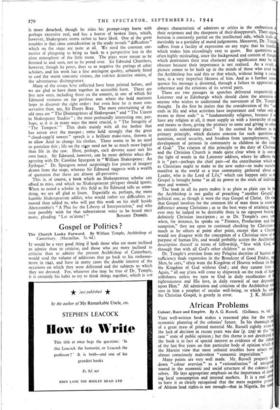Gospel or Politics ?
The Church Looks Forward. By William Temple, Archbishop of Canterbury. (Macmillan. 7s. 6d.) IT would be a very good thing if both those who are more inclined to admire than to criticise, and those who are more inclined to criticise than to admire the present Archbishop of Canterbury, would read the volume of addresses that go back to his enthrone- ment in 1942, and have in many cases the double interest of the occasions on which they were delivered and the subjects to which they are devoted. For, whatever else may be true of Dr. Temple, it is certainly his habit to try to think things together, which is not always characteristic of admirers or critics in the enthusiasm their responses and the sharpness of their disapprovals. Their appr hension is constantly partial on the intellectual side, which leads inevitably to a partiality of moral judgements. Moreover, Dr. Te suffers from a facility of expression on any topic that he handl which makes him exceedingly easy to quote. But quotations often highly misleading, since the background and context of tho which determines their true character and significance may be obscure because their importance is not realised. As a result, picture comes to be built up in the minds of those who read the Archbishop has said this or that which, without being a can ture, is a very imperfect likeness of him. And as a further con quence his message is distorted, through a failure to appreciate coherence and the relations of its several parts.
There are two passages in speeches delivered respectively Leicester and at Edinburgh which should claim the attention anyone who wishes to understand the movement of Dr. Tempt thought. In the first he insists that the consideration of the " ends in life and what activities have importance and value only means to those ends " is " fundamentally religious, because if have any religion at all, it must supply us with a hierarchy of en and means to them, giving the primacy to some and giving to oth an entirely subordinate place." In the second he defines as primary principle, which dictates concern for such questions nutrition, social security, and freedom from unemployment, " development of persons in community as children in the f of God." The relation of this principle to the duty of Chris and the Christian Church is made quite clear when it is seen the light of words in the Leicester address, where he affirms it is " part—perhaps the chief part—of the contribution which as Christians ought to make to the new order—to make ourseh manifest in the world as a true community gathered about Leader, who is the Lord of Life," which can happen only as Gospel is brought home " in all its power to the souls of individ men and women."
The book in all its parts makes it as plain as plain can be the Archbishop is not guilty of preaching " another Gospel," political one, as though it were the true Gospel of Christ. On that Gospel involves for the common life of man there is room difference among Christians ; as to the best ways of attaining w ever may be judged to be desirable there is no signpost bearing definitely Christian inscription ; as to Dr, Temple's own vi when, for instance, he speaks on " Finance Production and sumption," they are open to continual checking by Christians much as by others at point after point, except that a Chris would not disagree with the conception of a Christian view of purpose of human life, and would probably accept the Archbis description thereof in terms of fellowship, " first with God, through that with all God's other children " as true. Dr. Temple's aversion from any Pelagian doctrine of human sufficiency finds expression in the Broadcast of Good Friday, I Men, he says," often want the Kingdom of Heaven wthout its the Kingdom of God without God ; and they cannot have Again, " all our plans will come to shipwreck on the rock of h selfishness unless we turn to God in daily recollection of righteousness and His love, in daily renewal of our depen upon Him." All admiration and criticism of the Archbishop sees in him a prophet of secular well-being, to which he ad the Christian Gospel, is greatly in error. J. K. Mon!,


























 Previous page
Previous page